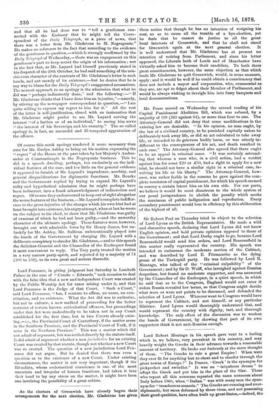Mr. Pease moved on Wednesday the second reading of his
Capital Punishment Abolition Bill, which was refused, by a majority of 199 (263 against 64), or more than four to one. The Attorney-General did not deny that some modifications in the- existing law are desirable. "In his opinion, no man ought, by' the law of a civilised country, to be punished capitally unless he deliberately took away life, or did an act calculated to take away life, or intended to do grievous bodily harm, or was utterly in- different to the consequences of his act, and death resulted in each case." The Attorney-General also agreed that there ought to be an appeal in criminal cases. "It was certainly astound- ing that whereas a man who, in a civil action, had a verdict against him for some £20 or £30, had a right to apply for a new trial, he should not have a similar right in a criminal case, in- volving his life or his liberty." The Attorney-General, how- ever, was rather feeble in the reasons he gave against the com- plete remission of capital punishment, for which his speech seemed to convey a certain latent bias on his own side. For our parts, we believe it would be most disastrous to the whole system of our penal jurisprudence to abolish the penalty which marks the maximum of public indignation and reprobation. Every secondary punishment would lose in efficiency by this obliteration of the highest of all.


































 Previous page
Previous page